Experiencing a government shutdown is a situation nobody desires, yet it remains a recurring concern in the United States political realm. This article explores the ramifications of a government shutdown on federal employees and offers insights into preparing for such an event.
How Should Federal Employees Prepare for a Government Shutdown?
Create a Budget
Knowing exactly what your monthly fixed, variable, and discretionary expenses are will help reduce stress and let you know what areas of your budget can be cut quickly. If a shutdown seems likely, prioritize bills and essential expenses. Plan to make arrangements with creditors or utility providers if necessary.
Build an Emergency Fund
Strive to have six to eight months’ worth of living expenses saved in an emergency fund. Prioritize needs over wants until you achieve this goal. Reduce discretionary spending and save as much as possible in the months leading up to a possible government shutdown.
Maximize Credit Options
Remember, credit should only be a temporary solution for emergencies. If you’re struggling to pay bills, consider the following:
- Reach out to your bank or credit union to discuss potential financial hardships. Some institutions offer special programs to federal employees during shutdowns.
- Open a new credit card that offers a 0% interest rate on spending for longer terms such as 12 to 24 months.
- Explore a Home Equity Line of Credit (HELOC). Before opening, make sure you understand all the associated costs and interest rates.
Use Retirement Savings Wisely
- Traditional IRAs and SEP IRAs may offer penalty-free hardship withdrawals; however, you will have to pay federal and state taxes.
- A Roth IRA allows you to withdraw original contributions without taxes or penalties.
- Consider a loan from your Thrift Savings Plan (TSP). A loan is not considered a withdrawal, so it avoids penalties and taxes. The loan will have a monthly payment that includes principal and interest over several years. The interest paid will go back into your TSP account. TSP loan funds will not be invested in the stock market.
Avoid Payday Loans
Steer clear of payday loans, as they come with high costs and can lead to a cycle of debt. The national average APR for payday loans is nearly 400%, much higher than credit card APRs.
What Happens During a Government Shutdown?
Furloughs and Reduced Paychecks
One of the most significant impacts of a government shutdown is the furloughing of federal employees. During a furlough, a large portion of the federal workforce is placed on unpaid leave until the government reopens. Employees deemed non-essential to the functioning of government agencies are the most affected. Although furloughed employees will receive back pay once the government reopens, the uncertainty of when that will happen can be financially distressing.
Essential Employees Work Without Pay
While many federal employees are furloughed, certain essential personnel continue to work during a government shutdown. These employees, such as law enforcement officers, air traffic controllers, and border patrol agents, are crucial for maintaining public safety and essential services. As a consequence of the shutdown, they are often required to work without receiving their regular paychecks until the shutdown is resolved.
Disrupted Services
Government shutdowns can disrupt various services provided by federal agencies, affecting the general public. Services like national parks, museums, and passport processing may be temporarily unavailable or delayed during a shutdown. Additionally, government-backed loans and grants may be delayed or frozen, causing financial difficulties for individuals and businesses.
Summary
Government shutdowns have real and significant impacts on federal employees and the general public. Furloughs, reduced services, and financial stress are just a few of the consequences that federal workers face during a shutdown. While it is uncertain whether there will be a government shutdown in 2024, it is crucial for federal employees to prepare themselves in the event the worse happens.
The content is developed from sources believed to be providing accurate information. The information in this material is not intended as tax or legal advice. Please consult legal or tax professionals for specific information regarding your individual situation. The opinions expressed and material provided are for general information and should not be considered a solicitation for the purchase or sale of any security. Securities and advisory services offered through Osaic Wealth, Inc., member FINRA, SIPC. Osaic Wealth is separately owned and other entities and/or marketing names, products or services referenced here are independent of Osaic Wealth. Representatives may not be registered to provide securities and advisory services in all states. Branch address: 10701 Parkridge Blvd, Ste 130, Reston, VA 20191. Branch phone: 571-543-2783.





